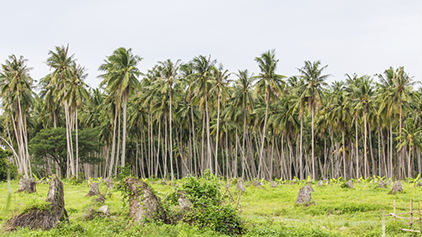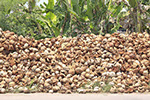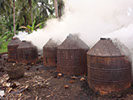If you don't accept the use of cookies please leave this website. Read more at our Terms page. Thank you.

Bringing Power to the People
Case Study - Coconut Production in the Philippines
 Today the coconut in some regions of the world is in reality tragically underutilised, from the point of harvest the husk is manually removed and thrown aside providing an idea home for the mosquito. Then when splitting the nut to expose the white meat the water inside is dumped directly into the ground, the two half shells are laid out on the ground to dry where they are exposed to contamination from insects, animals the environment and humans, the resulting effect of this copra (dried coconut meat) drying is a product that is unfit for human consumption due to dirt and the presence of alpha-toxins (carcinogenic).
Today the coconut in some regions of the world is in reality tragically underutilised, from the point of harvest the husk is manually removed and thrown aside providing an idea home for the mosquito. Then when splitting the nut to expose the white meat the water inside is dumped directly into the ground, the two half shells are laid out on the ground to dry where they are exposed to contamination from insects, animals the environment and humans, the resulting effect of this copra (dried coconut meat) drying is a product that is unfit for human consumption due to dirt and the presence of alpha-toxins (carcinogenic).
 This copra is removed from the shell shipped off and pressed at high temperature and pressure to produce an oil that further processing will turn into fuel oil, soaps and cooking oil which is banned for sale in many countries.
This copra is removed from the shell shipped off and pressed at high temperature and pressure to produce an oil that further processing will turn into fuel oil, soaps and cooking oil which is banned for sale in many countries.
The shell is sometimes turned into charcoal for further processing into activated carbon, however given the fact that it is produced either in a earthen pit or steel drum several negative aspects come into play. Firstly the smoke given off is a pollutant, harming people and vegetation alike. Lung cancer, amongst several other debilitating diseases, is well known amongst the subsistence farmers who work to produce the charcoal. Also half of all the original energy in the shell is given off as smoke and wasted to no good effect.
effect.
In contrast to all of the above, Pyro Yield will be offering all the technology required to set up a integrated coconut processing plant. The Pyro Yield system will come as a package which is a Fast Pyrolysis Reactor linked up to a steam turbine. The plant will take in coconut shell producing heat, activated carbon and electrical power. This containerised power plant will provide the power to de-husk the coconuts using hydraulics, with the husk going on to be processed into fuel pellets and geo-textiles. The nut, when split, will be processed under sterile conditions as will the collection and condensing of the water and the drying of the coconut meat to copra. The heat for the process will come from the Pyro Yield FPR itself.
The plant will provide all the power necessary to extract high grade cold pressed virgin oil, the meat residue will be milled into flour for human consumption.
The FPR in operation will bring about a shift from subsistence level charcoal and copra production, to improved working practices, income levels and the production of high-value, market-ready products at the point of source.
Dan Morgan, Director of Pyro Yield, has significant experience of working knowledge in the Philippines and with the coconut industry there.
Copyright 2014 Pyro Yield Ltd